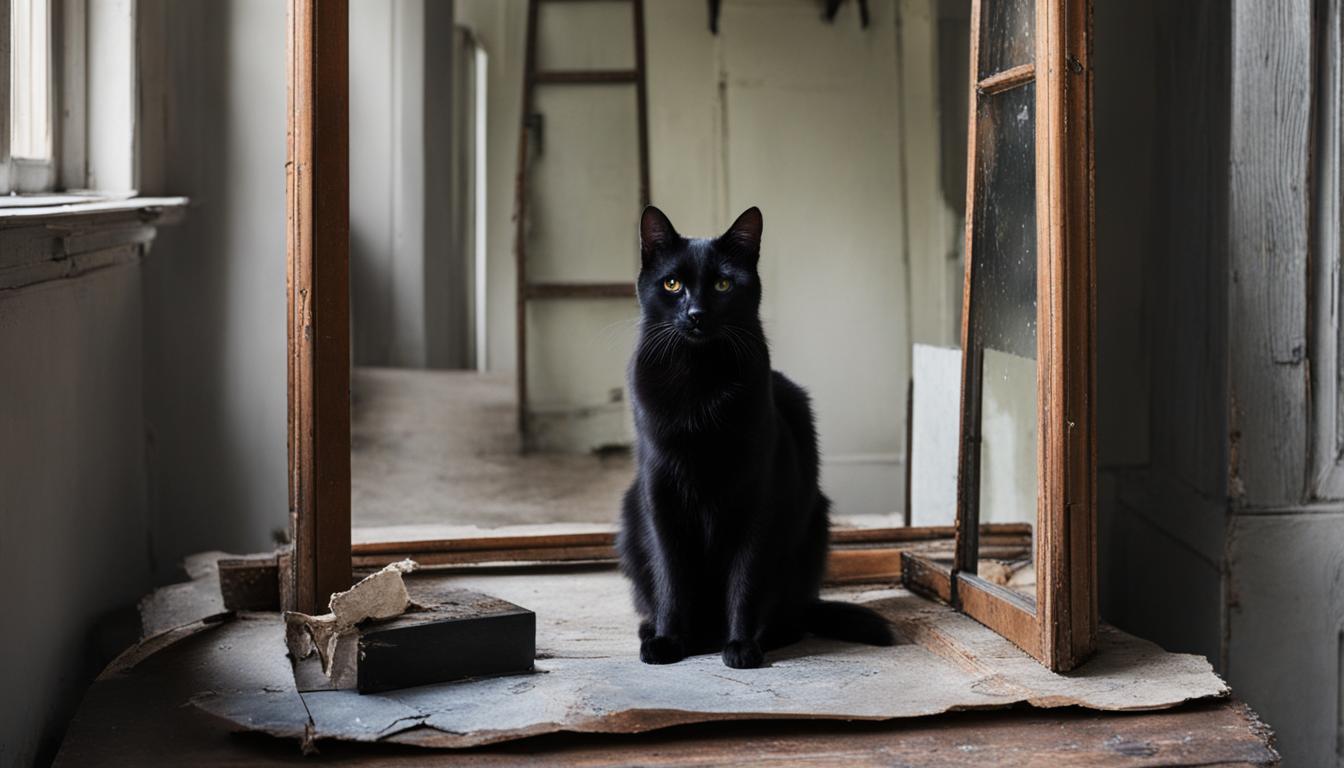Black cats have long been surrounded by myths and superstitions, leading many to believe that they bring bad luck. However, the truth is far from these unfounded beliefs. In this article, we will debunk the superstitions surrounding black cats and shed light on the fascinating truth about these beautiful felines.
Despite their sleek and mysterious appearance, black cats are just like any other cat when it comes to their traits and personalities. They are born with a black fur gene, which is simply a genetic mutation that causes their fur color to be black. In fact, black cats are more common than cats of any other color.
Key Takeaways:
- Black cats have long been associated with myths and superstitions
- Research has debunked these myths, showing that black cats are no more or less lucky than cats of other colors
- Black cats have unique personalities and deserve to be valued and loved just like any other cat
- During Black Cat Appreciation Day and other events, shelters highlight the beauty and unique qualities of black cats
- Understanding the cultural significance of black cats helps challenge stereotypes and foster inclusivity
The History of Black Cat Superstitions
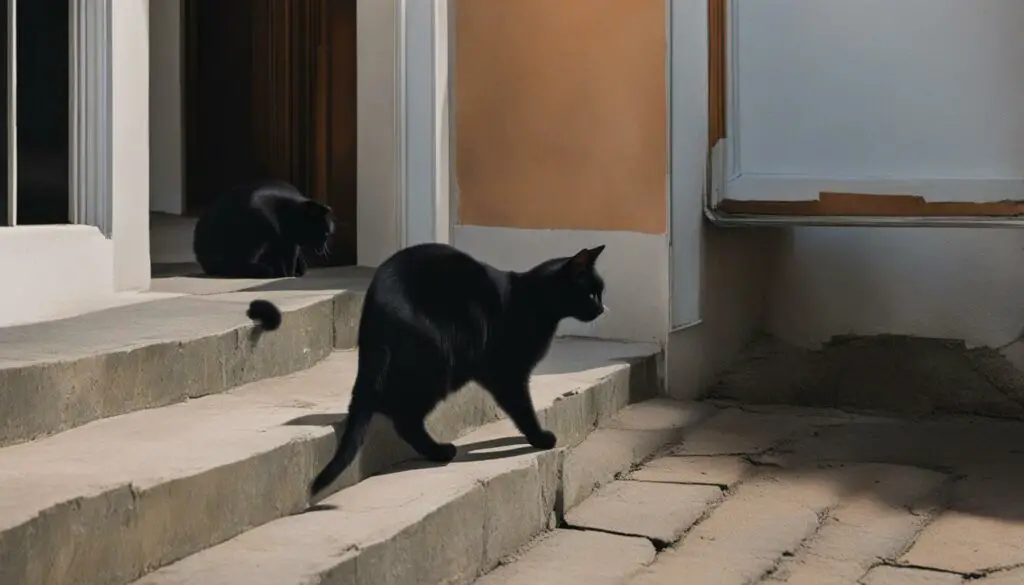
Black cats have a long and intriguing history intertwined with myths and superstitions. From being revered in ancient Egypt to being associated with witchcraft during the Middle Ages, black cats have been both admired and feared throughout different cultures and eras.
In ancient Egypt, black cats were highly regarded and worshipped because they bore a resemblance to the cat-headed goddess Bastet. These felines were believed to bring protection and good fortune to their owners. Their sleek black fur was seen as a symbol of elegance and mystique.
“In ancient Egypt, black cats were considered sacred and were worshipped as they resembled the cat-headed goddess Bastet, a deity associated with protection and home.”
However, the perception of black cats took a turn during the Middle Ages in Europe. They became associated with witchcraft and black magic, being viewed as familiars or companions to witches. Black cats were believed to be witches in disguise or the animal-shaped demons sent by witches to spy on humans.
These beliefs were fueled by legends and folklore that portrayed black cats as symbols of bad luck and evil. It was thought that crossing paths with a black cat would bring misfortune, and they were often associated with dark rituals and witchcraft practices.
Despite the superstitions surrounding black cats, it’s important to note that these beliefs are unfounded. Black cats are not inherently evil or bringers of bad luck. This negative perception stems from cultural beliefs and historical myths. In reality, black cats are no different from cats of any other color.
“Black cats became associated with witchcraft and black magic during the Middle Ages, often seen as familiars or companions of witches.”
Moreover, it’s worth mentioning that in some parts of the world, black cats are regarded as symbols of good luck and prosperity. For example, in Japanese folklore, a black cat crossing your path is considered a sign of good fortune. Similarly, in Scottish and English folklore, a black cat appearing on your doorstep is believed to bring wealth and prosperity.
It’s important to separate fact from fiction and not let superstitions dictate our perceptions of black cats. These beautiful creatures deserve to be appreciated and treated with love and kindness, just like any other cat.
The Truth About Black Cats and Bad Luck
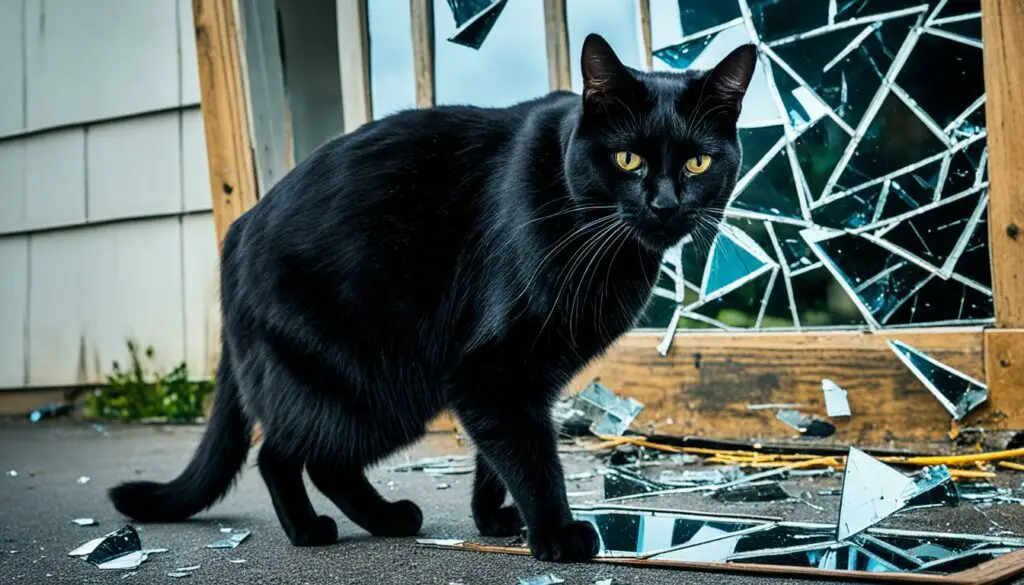
The belief that black cats bring bad luck is just a superstition. There is no factual basis for this belief, and it has been debunked by research and evidence. Black cats are no more or less lucky than cats of any other color. In fact, many cultures consider black cats to be symbols of good luck and prosperity. It’s important to recognize that black cats, like all cats, have unique personalities and temperaments and should be valued and loved for who they are.
When it comes to black cats and bad luck beliefs, the truth is that these negative associations are deeply rooted in historical superstitions. From the Middle Ages, black cats were unfairly linked to witchcraft and black magic, leading many to believe that they were harbingers of doom.
However, modern research and understanding have dispelled these myths surrounding black cats and bad luck. These beautiful felines are just as deserving of love, care, and companionship as any other cat, regardless of their fur color.
Black cats deserve to be celebrated and appreciated for who they are, free from the weight of superstitions. Their unique personalities and charm bring joy to countless households around the world.
Let’s break free from the chains of superstition and embrace black cats for the wonderful companions they are. It’s time to dispel the myths and give black cats the love and respect they deserve.
Why Are Black Cats Associated with Bad Luck?
The association between black cats and bad luck has its roots in historical and cultural beliefs. In many societies, black has traditionally been associated with darkness, evil, and the supernatural. As a result, black cats have often been portrayed as omens of misfortune.
Here is an example of a comparison table demonstrating the varying beliefs associated with black cats across different cultures:
| Culture | Belief about Black Cats |
|---|---|
| Egypt | Revered as sacred beings and bringers of good luck |
| Europe (Middle Ages) | Associated with witchcraft and believed to bring bad luck |
| Japan | Considered symbols of good fortune and prosperity |
| Scotland | Believed to bring wealth when a black cat arrives on your doorstep |
As we can see, the beliefs around black cats vary widely across cultures, highlighting the subjectivity of superstitions and reinforcing the need to challenge these unfounded assumptions.
In conclusion, black cats do not bring bad luck, and the superstitions surrounding them are baseless. Let’s celebrate black cats for the beautiful, loving, and loyal companions they can be. By dispelling these myths, we can build a more inclusive and understanding society where all cats, regardless of their color, are cherished and valued.
The Positive Associations with Black Cats
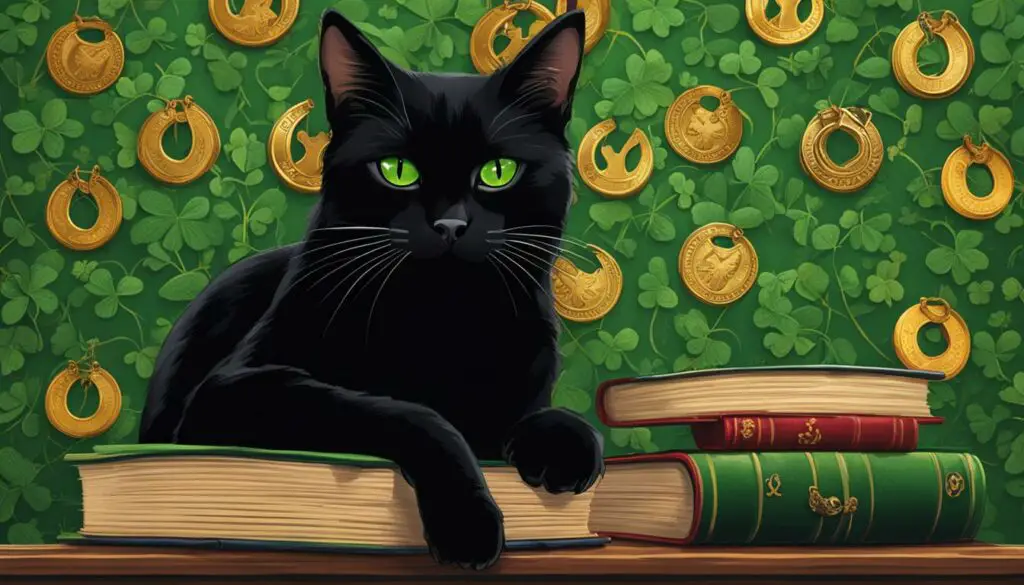
While black cats have been unfairly associated with bad luck, it’s important to highlight the positive associations as well. In some cultures, black cats are considered symbols of good luck and success.
For example, in Scotland, a black cat appearing on your doorstep is believed to bring wealth. In parts of the UK, a gift of a black cat symbolizes luck in marriage. Black cats have also been revered in folklore and mythology, often seen as magical creatures.
It’s important to view black cats with an open mind and appreciate their unique qualities.
Famous Black Cats in Folklore
Black cats have played prominent roles in folklore and mythology throughout history. Here are a few famous black cats:
- Black Cats in Ancient Egypt:
- The Black Cat of Killakee:
- The Ship’s Cat of HMAS Encounter:
In ancient Egypt, black cats were considered sacred and were associated with the goddess Bastet. They were believed to bring protection and good fortune.
In Irish folklore, the Black Cat of Killakee is said to guard a buried treasure. It is believed that if you catch a glimpse of the cat, you will be blessed with good luck.
During World War II, a black cat named “Simon” served as the ship’s cat aboard the Australian naval ship HMAS Encounter. Simon provided comfort and companionship to the crew and was awarded the Dickin Medal, the highest award for animal bravery, for his service.
These examples showcase the positive role that black cats have played in various cultures and highlight their importance and significance.
Varieties of Black Cats in Pop Culture
Black cats have also made their mark in popular culture, appearing in movies, books, and even as familiar companions to famous characters. Here are a few notable examples:
- Salem Saberhagen from Sabrina the Teenage Witch:
- Binx from Hocus Pocus:
- Bagheera from The Jungle Book:
Salem, a black cat, is one of the most iconic feline characters in pop culture. Known for his witty remarks and sassy personality, Salem adds humor and excitement to the show.
Binx, a black cat, plays a key role in the Halloween movie “Hocus Pocus.” He helps the main characters in their quest to defeat the Sanderson sisters and break their curse.
Bagheera, a sleek black panther, is a wise and protective friend to Mowgli in the Disney classic “The Jungle Book.” His loyalty and guidance are essential throughout the story.
These examples demonstrate the positive portrayal of black cats in popular culture and their ability to captivate audiences with their charm and mystique.
| Country | Black Cat Belief |
|---|---|
| Japan | Black cats are believed to bring good luck and are considered symbols of prosperity. |
| Scotland | A black cat appearing on your doorstep is believed to bring wealth and prosperity. |
| UK | A gift of a black cat is seen as a symbol of luck and is said to bring success in marriage. |
| India | Black cats are seen as protectors and are believed to ward off evil spirits. |
These cultural beliefs showcase the positive associations with black cats in different parts of the world.
The Personality of Black Cats
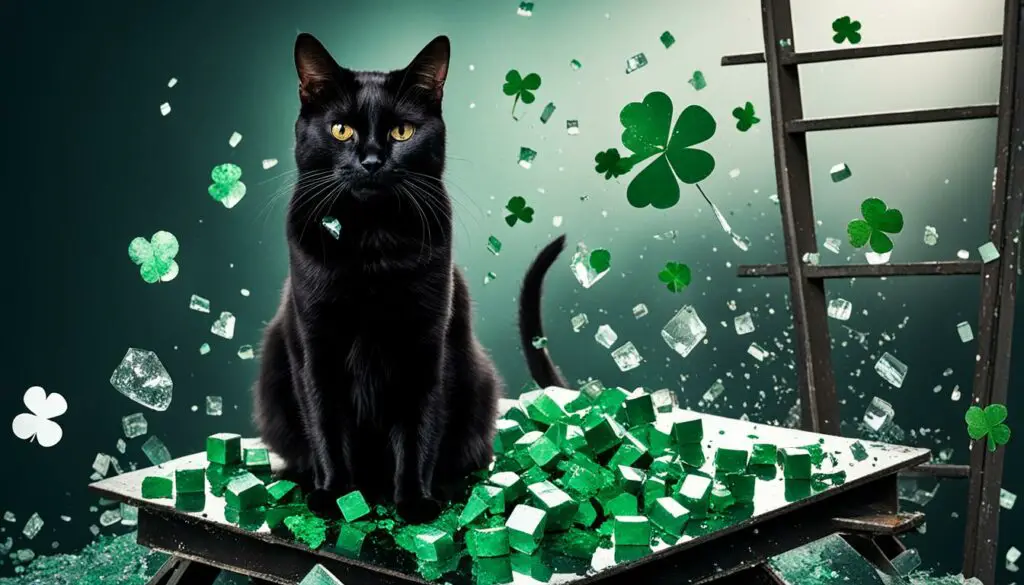
Despite the long-standing superstitions and myths about black cats, their personality traits are not unique to their color. Black cats have the same diverse range of personalities as cats of any other color. While some individual black cats may exhibit certain traits, it is crucial not to generalize and assume that all black cats are the same.
Many black cat owners can attest to their cats being loving, loyal, and affectionate companions. Just like any other cat, black cats form strong bonds with their owners and bring joy to their lives. Each black cat has its own unique personality, and it’s important to judge them based on their individual characteristics.
It is unfair to perpetuate the myths and stereotypes surrounding black cats’ personalities. These misconceptions often portray them as less friendly, less playful, or more aggressive. However, there is no factual evidence to support these beliefs. Black cats are just as capable of forming deep connections and displaying affection as cats of other colors.
By understanding and appreciating the individuality and diversity among black cats, we can challenge the myths and superstitions that have plagued them for centuries. Let’s celebrate the unique personalities of black cats and acknowledge that they, like all cats, are deserving of love, care, and a happy home.
“Black cats are not inherently any different in their personalities than any other cat. It’s all about how you raise and treat them.” – Sarah, black cat owner
Celebrating Black Cats
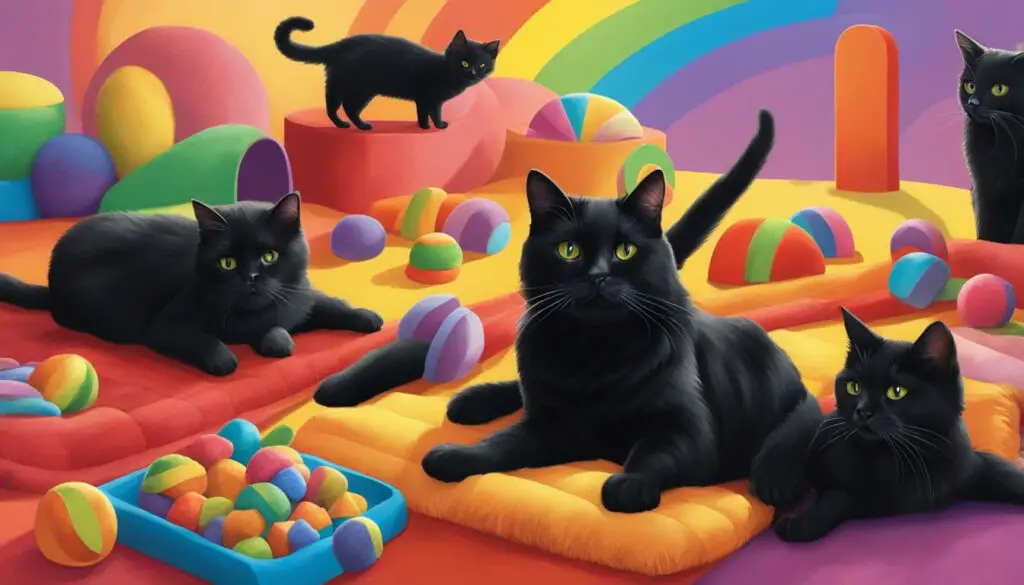
Despite the superstitions surrounding black cats, there are efforts to celebrate and promote these beautiful felines. Black Cat Appreciation Day is observed on August 17th, National Black Cat Day is on October 27th, and October is designated as Black Cat Appreciation Month.
During these times, shelters often have adoption specials specifically for black cats to challenge the stigma and increase their chances of finding loving homes. It’s a great opportunity for people to learn more about black cats, dispel myths, and appreciate their unique beauty and personalities.
The Cultural Significance of Black Cats
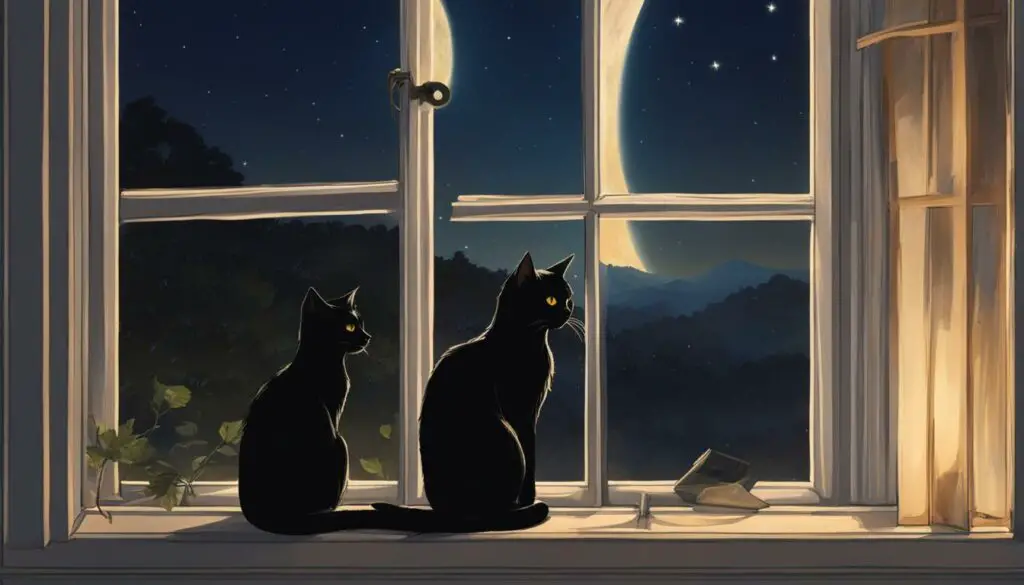
The cultural significance of black cats spans across different regions and societies, with varying beliefs and superstitions associated with these majestic felines. While some cultures perceive black cats as symbols of bad luck and misfortune, others view them as bringers of good luck and prosperity.
The diversity of beliefs surrounding black cats highlights the rich tapestry of human cultures and traditions. It’s important to respect and appreciate these cultural differences, recognizing that superstitions should not dictate our perceptions of these beautiful creatures.
By understanding the cultural significance of black cats, we can challenge stereotypes and foster a more inclusive and accepting attitude towards them. Let’s take a closer look at some of the myths and superstitions surrounding black cats in different parts of the world:
Around the World: Black Cat Superstitions
| Region | Superstition |
|---|---|
| Egypt | Black cats were revered in ancient Egypt and associated with the cat-headed goddess Bastet. They were believed to bring protection and good fortune. |
| Europe (Middle Ages) | During the Middle Ages, black cats became associated with witchcraft and black magic. They were thought to be spies for witches or their animal-shaped demons. |
| United States | Some people believe that crossing paths with a black cat brings bad luck, while others see them as symbols of good luck and prosperity. |
| Japan | In Japanese folklore, black cats are considered good luck, especially for single women who hope to find love and marriage. |
These examples illustrate the diverse interpretations and cultural significance of black cats. It’s fascinating to see how different societies ascribe various meanings to these animals.
“The superstition surrounding black cats reflects the diversity of human beliefs and traditions.” – Anonymous
It’s crucial to embrace cultural diversity and challenge the stereotypes associated with black cats. By doing so, we can create an environment of inclusivity and appreciation for these enchanting creatures.
Debunking Other Cat Myths
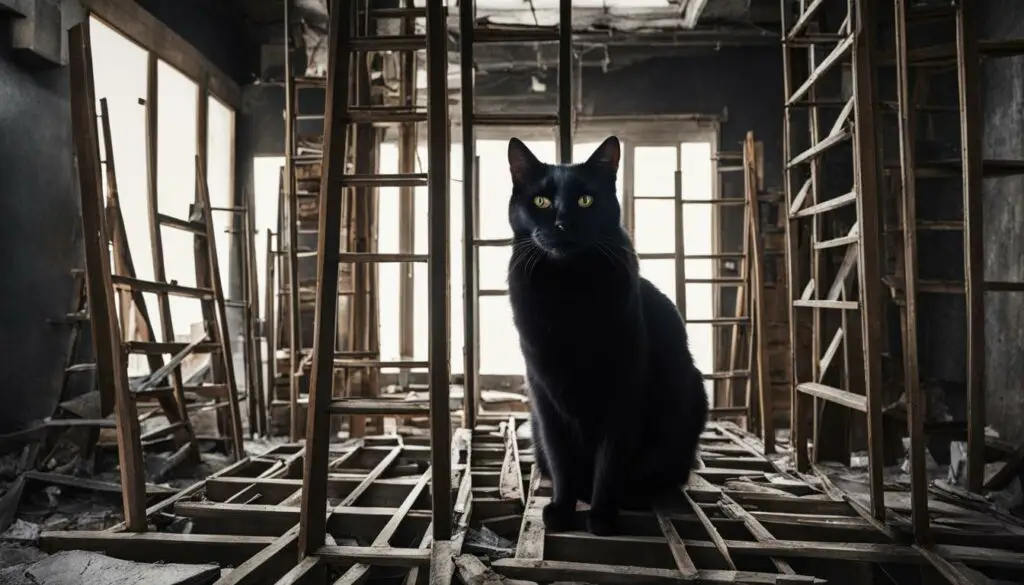
While black cats have their fair share of superstitions, there are other myths and misconceptions surrounding cats in general that deserve to be debunked. Let’s separate fact from fiction and gain a better understanding of our feline friends.
- Cats are unloving and independent: Contrary to popular belief, cats are capable of forming strong bonds with their owners and showing affection. While their behaviors and preferences may differ from those of dogs, cats have their own unique ways of expressing love and companionship.
- Cats always land on their feet: The idea that cats have an innate ability to always land on their feet is a myth. While they do possess remarkable agility and balance, not all falls result in a cat landing safely. Cats can sustain injuries from high falls like any other animal.
- Cats have nine lives: Cats are not blessed with multiple lives. This belief stems from their innate ability to escape dangerous situations and their remarkable resilience. However, cats are still vulnerable to accidents and health issues like any other living being.
It’s essential to dispel these myths and foster a better understanding of cats. By appreciating their unique qualities and behaviors, we can create stronger bonds and provide the care and love they deserve.
Cats and Water
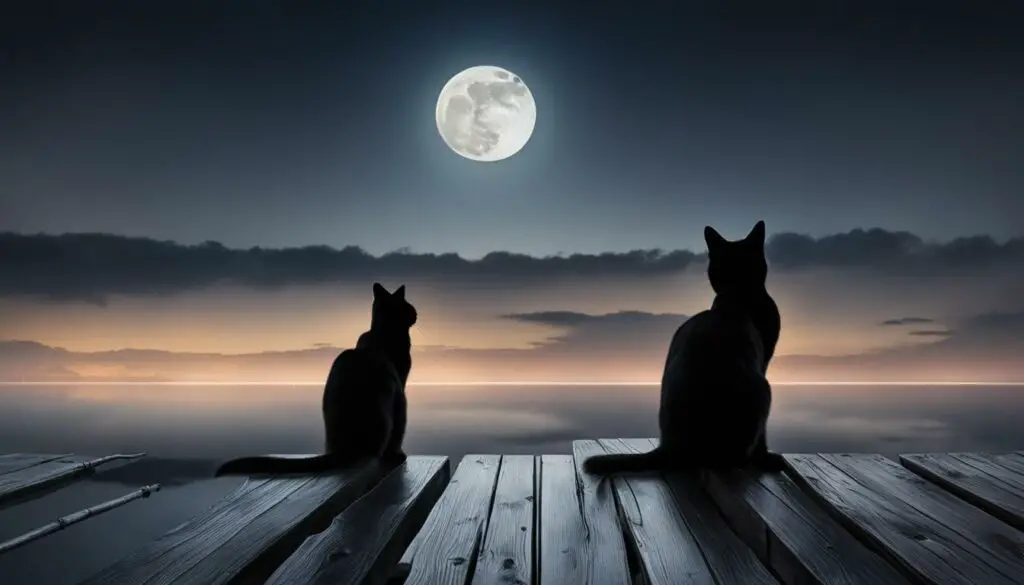
One common myth about cats is that they hate water. While it’s true that most cats are not fond of getting wet, they are not universally averse to water. Some cats may enjoy playing with water or even swimming. The preference for water varies among individual cats, just like any other preference. It’s important to remember that cats are unique individuals with their own personalities and preferences, and not all cats fit the stereotypes or myths associated with them.
Breaking the Stereotype
Contrary to popular belief, not all cats shy away from water. Some cat breeds, such as the Maine Coon and Bengal, are known to have a natural affinity for water. These cats may even dip their paws into water bowls or join their humans for a shower. Additionally, some cats may find water playtime to be entertaining, chasing drops or toys in the sink or bathtub. It’s important to cater to the individual preferences of your cat and respect their boundaries when it comes to water.
“My cat, Luna, is fascinated by water. Whenever I turn on the faucet, she comes running and tries to catch the water droplets. It’s like she’s playing her own little water game!” – Sarah, cat owner
Introducing Water to Cats
If you need to bathe your cat or introduce them to water, it’s essential to do so gradually and patiently. Start by providing a shallow container of water for your cat to explore. Offer positive reinforcement, such as treats or praise, to help them associate water with positive experiences. Avoid forcing your cat into water or causing unnecessary stress. Remember, building trust and ensuring your cat feels safe is key to a positive water introduction.
Keeping Cats Hydrated
While cats may have mixed feelings about water, it’s crucial to ensure they stay hydrated. Cats have a low thirst drive and may not drink enough water from a bowl alone. Offer fresh water daily and consider providing a cat-friendly water fountain, which can attract their attention and encourage regular drinking. Wet foods, such as canned or moistened kibble, also contribute to a cat’s overall hydration. Remember to consult your veterinarian for specific recommendations tailored to your cat’s needs.
Embracing Uniqueness
Just like humans, cats have their own preferences and personalities. While many cats may not be fans of water, others may surprise you with their fascination or willingness to get wet. It’s essential to understand and respect the individuality of cats, debunking the myth that all cats dislike water. Celebrating the diversity of cat personalities and debunking stereotypes creates a more accurate understanding of our feline friends.
Cats and Night Vision
There is a common belief that cats can see in complete darkness. While cats have excellent night vision compared to humans, they cannot see in complete darkness. Their eyes are adapted to low light conditions, allowing them to see better than us in dim lighting. Cats have a higher number of rods in their retinas, which are responsible for detecting light. However, they still rely on some level of ambient light to see clearly. It’s important to understand the capabilities of a cat’s vision and not make assumptions based on myths or misconceptions.
Cats and Affection
There is a common misconception that cats are unloving and less affectionate compared to dogs. While it’s true that cats have a different way of showing affection, they are capable of forming strong bonds with their owners. Cats may display affection through purring, rubbing against their owners, kneading, and seeking physical proximity. Each cat has its own unique personality and may express affection in different ways. It’s important to recognize and appreciate the affection that cats can show, even if it may be different from what we expect.
Conclusion
In conclusion, it’s time to debunk the superstitions surrounding black cats. Contrary to popular belief, black cats do not bring bad luck. These myths are unfounded and have no factual basis. It’s important to dispel these misconceptions and appreciate black cats for the beautiful, loving, and loyal companions they can be.
Just like any other cat, black cats have their own unique personalities and should not be judged based on superstitions or stereotypes. They deserve to be valued and loved for who they are. By challenging these myths and educating ourselves about cats, we can promote a more inclusive and accepting attitude towards them.
Let’s celebrate black cats and all cats for the wonderful pets they are. Whether black, tabby, or calico, cats bring joy, companionship, and love into our lives. By dispelling cat myths and embracing the truth, we can create a world where all cats are appreciated and cherished.
FAQ
Do black cats bring bad luck?
No, black cats do not bring bad luck. This is just a superstition with no factual basis.
Are black cats unlucky?
No, black cats are not unlucky. They have the same chances of bringing good luck as cats of any other color.
What are some myths about black cats?
Some myths about black cats include that they bring bad luck, are associated with witchcraft, and have aggressive personalities.
Are there any superstitions around black cats?
Yes, there are superstitions that black cats bring bad luck, especially in Western cultures.
What is the history of black cat superstitions?
Black cats were revered in ancient Egypt but became associated with witchcraft and black magic in Europe during the Middle Ages.
Do black cats have any positive associations?
Yes, in some cultures, black cats are considered symbols of good luck and prosperity.
What is the personality of black cats?
Black cats have the same diverse personalities as cats of other colors. Stereotypes that portray them as less friendly or aggressive are not based on factual evidence.
How can we celebrate black cats?
Black Cat Appreciation Day, National Black Cat Day, and Black Cat Appreciation Month are opportunities to appreciate and promote black cats.
What is the cultural significance of black cats?
The cultural significance of black cats varies from region to region. While they are seen as unlucky in some places, they are considered symbols of good luck in others.
What are some other cat myths that need to be debunked?
There are many myths about cats, such as their hatred for water and their ability to see in complete darkness.
Do cats hate water?
While most cats are not fond of getting wet, some may enjoy playing with water or even swimming. It varies among individual cats.
Can cats see in complete darkness?
No, cats cannot see in complete darkness. They have excellent night vision but still require some level of ambient light to see clearly.
Are cats unloving and less affectionate than dogs?
No, cats are capable of forming strong bonds with their owners and can show affection in their own unique ways.
